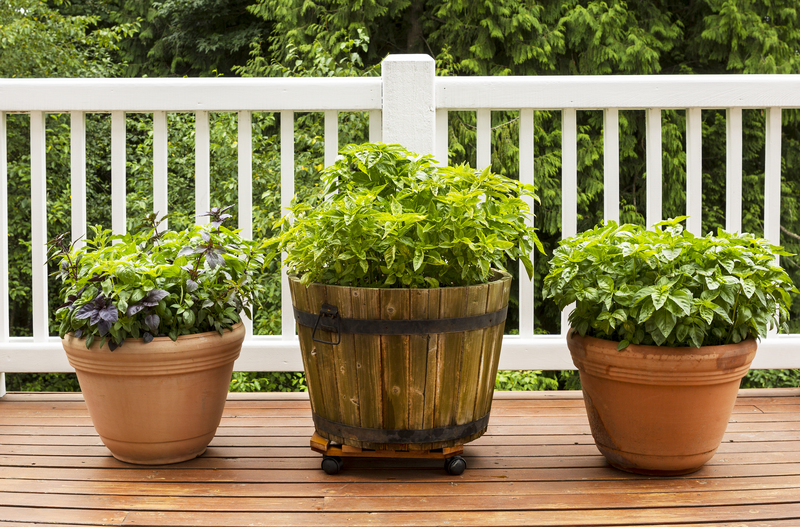Launching Your Garden Makeover from Neglect to Beauty
Posted on 10/09/2025
Launching Your Garden Makeover from Neglect to Beauty
Is your yard looking tired and unloved? Transforming a neglected garden into a breathtaking outdoor haven might feel daunting, but with planning, inspiration, and effort, you can restore it to its full flourishing potential. In this comprehensive guide, we'll explore every step of a successful garden makeover: from reclaiming overgrown spaces to designing vibrant borders and nurturing your new paradise into lasting beauty.

Why Consider a Complete Garden Makeover?
Many homeowners delay tackling their gardens, letting weeds take over, patios crumble, and borders vanish under brambles. Yet reviving these forgotten spaces offers rich rewards:
- Boost curb appeal and property value
- Create a personal retreat and entertainment venue
- Support local biodiversity with thoughtful plantings
- Experience the wellness benefits of gardening, from stress relief to physical exercise
Embarking on a garden restoration isn't just about aesthetics; it's an investment in your lifestyle and environment.
Step 1: Assessing Your Neglected Garden
Before you can launch into your garden makeover journey, you need a clear picture of where you're starting. Try these steps:
Conduct a Thorough Survey
- Walk around your yard, noting overgrown areas, dead plants, compacted soil, and hidden features (like forgotten pathways or buried patios).
- Take photos from different angles to compare your progress as you transform your outdoor space.
- Make a list of features to retain or restore (such as mature trees or stone walls) versus elements to remove.
Analyze Sun, Shade, and Soil Conditions
- Observe the changing light throughout the day – where does the sun linger, and where is it shady?
- Test your soil (with a kit or professional service) for pH, composition, and drainage. Healthy soil is crucial for long-term garden success!
Tip: If you are unsure about plant identification, apps and local gardening clubs can help with distinguishing weeds from hidden gems before you clear everything.
Step 2: Planning Your Garden Revival
One of the most exciting – and often overlooked – phases is mapping out your garden renovation plan.
Visualize Your Ideal Garden
- Look for inspiration in magazines, online portfolios, or botanical gardens. Not sure what suits your yard? Explore cottage, modern, wildlife-friendly, or low-maintenance garden styles.
- Sketch out a rough design, marking desired zones such as seating areas, play space, vegetable beds, or wildflower borders.
- Factor in essential sightlines, focal points, and accent features (like benches, sculptures, or water features).
Set Realistic Budgets and Timelines
- Decide what tasks you'll tackle yourself versus hiring professionals for hard landscaping, tree work, or large clearances.
- Break down your garden transformation into stages, prioritizing structural jobs (like fence repair or tree removal) before planting.
- Be mindful of your time, budget, and physical limits. Even small-scale changes can create big impact when thoughtfully executed!
Step 3: Clearing and Preparing the Space
Now comes the hands-on part: reclaiming your neglected garden. A well-prepared plot is the foundation for every successful garden makeover.
Removing Weeds and Debris
- Start with big, obvious debris: fallen branches, trash, old pots, or derelict furniture.
- Identify and dig out persistent perennial weeds, roots and all. Solarizing (covering soil with clear plastic for several weeks) can help kill off tough weed banks in sunny areas.
- Use a strimmer or mower to tackle grass and brambles, but don't over-clear until you're ready to replant as you may disturb wildlife habitats.
Restoring Lawns, Patios, and Boundaries
- Assess lawn health: remove moss, re-seed bald patches, or even consider relaying turf if grass is beyond saving.
- Pressure wash patios and flagstones; repair or replace damaged paving, fences, or gates to establish a safe and clean framework.
- Compost organic waste where possible – healthy compost feeds your future plants!
Improving Soil and Drainage
- Double-dig or fork over compacted soil, incorporating organic matter like compost, leaf mold, or well-rotted manure.
- Correct drainage problems with raised beds, French drains, or simple mulches.
- Don't rush this stage! Great gardens are rooted in good soil structure and nutrition.
Step 4: Designing and Planting for Year-Round Beauty
With your garden canvas cleared and refreshed, it's time to bring vision to life. Choosing the right structure and planting combination is key to creating a beautiful transformed garden that lasts.
Hard Landscaping & Features
- Install paths to invite exploration and define zones.
- Consider raised beds, terraces, or retaining walls for slope management and planting variety.
- Plan seating areas to capture sun/shade at your preferred times of day.
- Add lighting, birdbaths, or focal sculptures for evening interest.
Selecting Plants for Lasting Impact
- Choose a balance of evergreen and deciduous shrubs, perennials, bulbs, and self-seeding annuals.
- Pick native or well-adapted species to maximize wildlife value and minimize maintenance.
- Layer heights for a lush effect--tall trees and shrubs at the back, mid-level perennials, and low groundcovers up front.
- Plan for continuity: Select plants with staggered flowering and foliage interest so your restored garden shines in every season.
Eco-Friendly and Budget-Friendly Additions
- Repurpose materials: old bricks, pallets, or stones can create rustic edges and features.
- Grow from seeds or cuttings for a cost-effective border makeover.
- Include wildlife-friendly elements: pollen-rich flowers, log piles for insects, or a small pond for frogs and birds.
Step 5: Caring for Your Revived Garden
After your initial garden upgrade, maintenance ensures your work endures and beauty flourishes year after year.
- Watering: Establish new beds with regular deep watering; switch to less frequent but thorough soaks for mature plants.
- Mulching: Apply organic mulch to suppress weeds, conserve moisture, and feed the soil naturally.
- Pruning: Shape shrubs and trees at the right time of year; deadhead spent flowers to encourage repeat blooms.
- Feeding: Use slow-release fertilizers or compost to develop strong, healthy plants.
- Weeding: Stay on top of weeds--early intervention means less work later!
- Pest Management: Encourage beneficial insects and use non-toxic methods to limit problem pests.
Remember: A little regular care beats an annual blitz!
Innovative Ideas for Your Garden Transformation
Vertical Gardening
- Use trellises, wall-mounted pockets, or recycled gutters to add interest and maximize small areas.
- Grow climbers like clematis, jasmine, or climbing roses for height and fragrance.
Edible & Ornamental Blends
- Mix herbs and veggies with flowers for practical beauty: nasturtiums, calendula, and chard offer vibrant color and tasty harvests.
- Install raised kitchen beds near your door for easy access.
Low-Maintenance Makeover
- Opt for drought-tolerant perennials (like lavender, sedum, and ornamental grasses) to reduce watering chores.
- Incorporate weed-suppressing fabric under gravel or bark paths.
Overcoming Common Garden Renovation Challenges
What if I Have Limited Time or Budget?
Focus on one area: create a simple border makeover with hardy shrubs and mulch, or restore a small seating area for instant enjoyment. Your yard revival can progress in easy, rewarding stages.
Dealing with Persistent Weeds or Pests
- Keep a routine--monthly checks and immediate action stop small problems becoming overwhelming.
- Embrace biodiversity: wildflowers, bug hotels, and trees attract natural pest predators.
Managing Slopes or Tricky Spaces
- Terrace steep ground with retaining walls or railway sleepers for manageable levels.
- Shade gardens benefit from ferns, hostas, and spring bulbs.
Seasonal Considerations for Year-Round Garden Appeal
Spring
- Sow annuals, plant bulbs, and divide perennials to refresh borders.
- Prune shrubs like roses and hydrangeas for vigorous growth.
Summer
- Harvest edible crops and deadhead flowers to prolong blooming.
- Mulch to retain moisture and prevent soil baking.
Autumn
- Plant trees and shrubs--autumn roots establish quickly before winter dormancy.
- Divide and replant spring-flowering bulbs.
- Rake leaves and add to your compost heap.
Winter
- Prune fruit trees and delayed-prune roses.
- Protect tender plants with fleece or mulch.
- Plan next year's upgrades from the warmth of your home!

Frequently Asked Questions
How long does a full garden makeover take?
It depends on the scale – small garden rejuvenations can take a few weekends, while extensive redesigns may span months (or phases across multiple years). Be patient – every season brings new rewards.
Can I restore my neglected garden without a big budget?
Absolutely! Prioritize soil improvement, re-use materials, start plants from seed, and focus effort where you use the space most.
What's the easiest way to maintain beauty after a garden transformation?
Mulch generously, plant densely to crowd out weeds, and stick to a monthly garden care routine. Choose robust plants suited to your location for a low-maintenance yet stunning result.
Conclusion: Start Your Garden's Transformation Today
Whether you're facing a jungle of brambles or an uninspired patch of patchy lawn, reviving your garden is entirely achievable with thoughtful planning and steady, creative effort. A stunning garden makeover doesn't happen overnight, but every clearing, planting, and nurturing task brings you closer to a lush, vibrant retreat you'll love for years to come.
Ready to transform your neglected garden into beauty? Gather inspiration, start small, and embrace the journey--your dream outdoor sanctuary awaits!
Latest Posts
Evergreen Climbers for Shade: From Dim to Dazzling with Greenery
Growing Green: Gardens as a Climate Change Countermeasure
Gardening Toolkit: Essentials for Outdoor Aficionados

